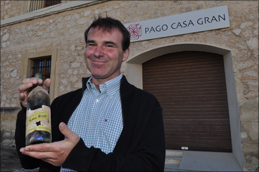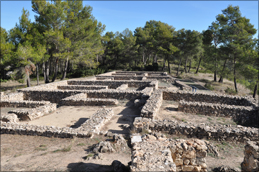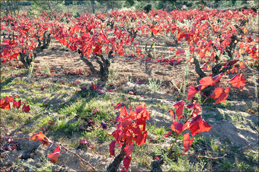We are sorry, this page has not been translated yet.
Pago Casa Gran
Carlos Laso Galbis is a driven man: When he is not busy with his vines or the olive, apricot and almond crops, he is there to assist and advise his two sisters. Since the death of their father, they have been managing the family furniture factory in Moixente around 70 kilometres inland from Valencia.

Unusual for Spain: Carlos Laso produces a wine with the Gewürztraminer grape.
But viticulture has clearly been Carlos’ passion since 2000. The picturesque Valles de les Alcusses in the hinterland of Moixente is well known for a well-preserved and partially rebuilt Iberian settlement. It lies on a narrow, high plateau at the foot of which lies the Pago Casa Gran vineyard with its 45 hectares of vines.
Gewürztraminer from Spain

Directly above the vineyards of Pago Casa Gran lie the remains of an old Iberian settlement.
On the chalky, clayey and sandy soils, the red varieties Monastrell, Garnacha Tintorera (Alicante Bouschet), Syrah, Cabernet Sauvignon and Petit Verdot seem to thrive equally as well as the white Moscatel and Gewürztraminer from which the Viña Llopis is produced. The Gewürztraminer is probably an exclusive exception for this region. Carlos’ father got to know and appreciate the variety in Germany and brought home it to Spain. On Pago Casa Gran, some of the grapes are harvested by hand and some by machine. Oenologist Juan Vincente Alcañiz is responsible for vinification in the new cellar building.
Grant awarded for Delinat philosophy

No other vine takes on such a glowing red colour in the late autumn as the Garnacha Tintorera.
Carlos has been cultivating his grapes organically since 2005. Currently, he is investing primarily in greater biodiversity. In the context of a nationally advertised state funding program in Spain, he submitted a project that is fundamentally based on the new Delinat guidelines. The project has been approved, so Carlos is getting welcome financial support for the measures he has planned. All the larger vineyard plots are being upgraded with a row of olive trees. To achieve this, it will be necessary to rip out two rows of vines in each case. Carlos has left vegetation standing in the vineyards since 2005. This does dry out in the summer, but it flourishes again over the winter. The winemaker is convinced that this natural competition is good for the vines. For some time now, he has been experimenting with special new seed mixtures and he expects even better results from them.




